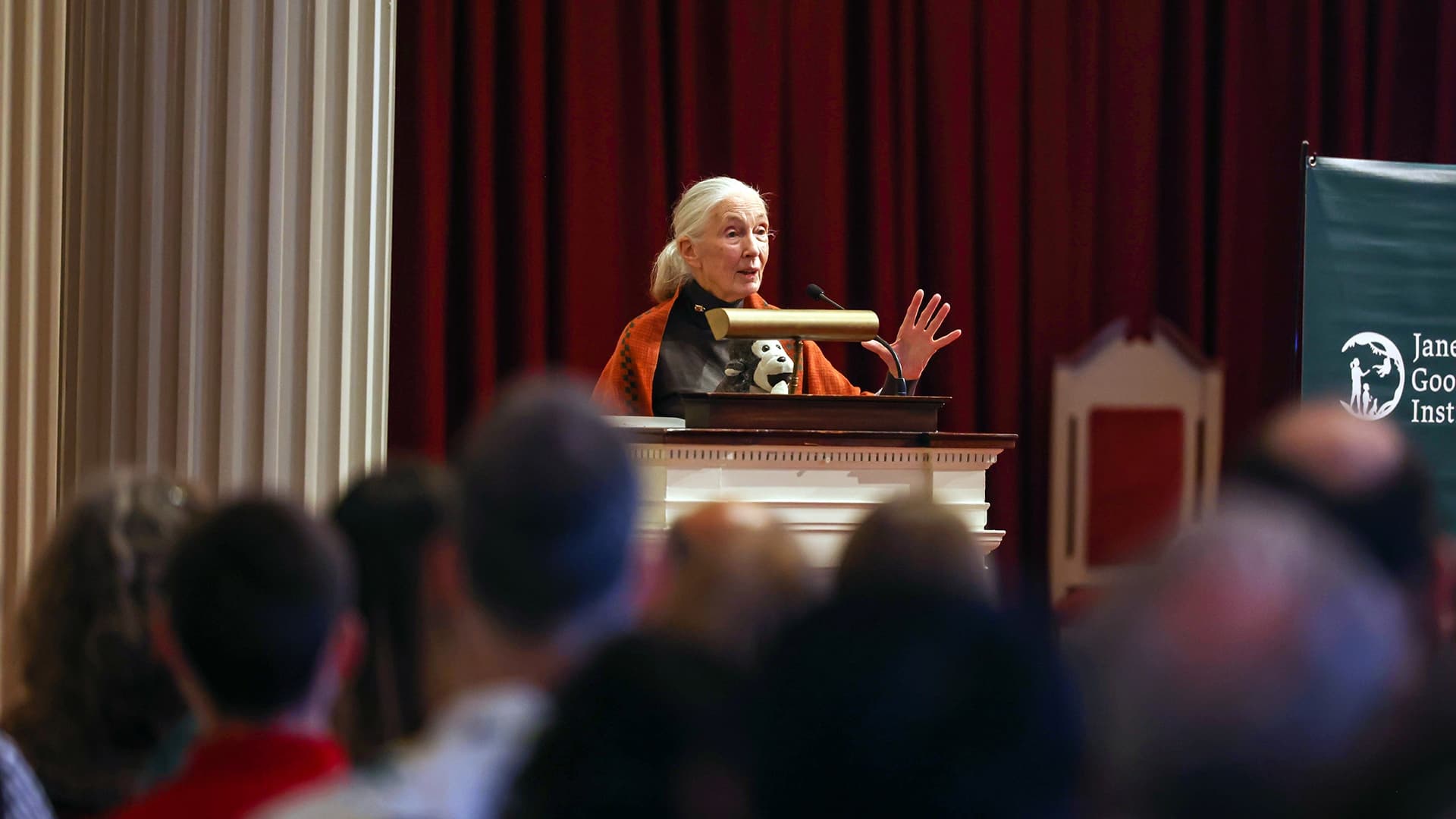‘Nature Will Come Back’
Famed Primate Researcher Jane Goodall Outlines Reasons for Hope

Bringing a message of hope in the face of dark times, groundbreaking field researcher Jane Goodall spoke to a capacity crowd at Memorial Chapel about her work with chimpanzees as well as her activism.
Photo by Stephanie S. Cordle
A famed scientist who broadened humanity’s understanding of itself through groundbreaking studies of some of our closest animal relatives told a campus audience Wednesday that amid the darkness arising from brutal wars and threats from climate change, there are valid reasons to hope—and to choose action over despair.
“We get to choose what kind of impact we make”—from removing litter to planting trees to eating plant-based diets, British ethologist and author Jane Goodall told a capacity crowd at the University of Maryland’s Memorial Chapel. “We can all choose what we care about.”
Studying chimpanzees in Tanzania while in her 20s, Goodall observed them removing termites from a termite mound with a stick to eat—the first documented evidence that animals other than humans could make and use tools. The profound finding spurred her mentor, famed paleoanthropologist Louis Leakey, to declare, “Now we must redefine tool, redefine man, or accept chimpanzees as human.”
Her in-depth studies of chimpanzees’ individual “personalities” and their societal bonds further expanded our knowledge of primates, and Goodall has spent the majority of her 88 years as a popular spokeswoman for science through her books, the pages of National Geographic and television programs like “Wild Kingdom.”
In her UMD lecture, co-sponsored by the College of Behavioral and Social Sciences and the College of Computer, Mathematical, and Natural Sciences, the United Nations Messenger of Peace narrated her journey from an animal-loving girl who once filled her bed with earthworms to an early-career scientist to a budding activist. The National Institutes of Health’s decision last year to end its chimp experiments and send test subjects to sanctuaries was the culmination of her nearly 40-year fight.
Her next step in activism was when she realized the hopes and priorities of people who live near the animals she studies must take precedence too; her longtime collaborator Lilian Pintea, vice president of conservation science for the Jane Goodall Institute (JGI) USA, gave a short talk to the Maryland audience about its TACARE program, which partners with local populations to create sustainable livelihoods while promoting environmental protection.
Her most recent work, including last year’s “The Book of Hope: A Survival Guide for Trying Times,” shifts toward humanity specifically, retaining the underpinnings of science while finding numerous reasons to be optimistic:
The power of the human brain
Although Goodall’s chimp studies were instrumental in showing how smart other species can be, none could come close to setting up the technology in use at Memorial Chapel or give a lecture—making it strange that the most intellectual of creatures is also the most destructive of Earth’s environment. But by connecting the brains, poetically speaking, she said, to our hearts, that instinct can be directed to solve many problems now besetting humanity.
The resiliency of nature
Even if humans make a mess of nature sometimes, we don’t control it, Goodall advised. She cited examples of once-endangered forests and species around the world that have since rebounded, only partly through human intervention. “Give it time and maybe some help, and nature will come back,” she said. “These places that are barren and deserted, my goodness, they can come back. Mother Nature returns.”
The power of young people
Goodall’s global organization, Roots and Shoots, stemmed from her interaction with youths in Tanzania who told her there seemed to be little reason to hope for the future. Since its 1991 founding, the program has spread worldwide from preschool through college, providing a caring community while students work to preserve the environment. “Even as I speak, there are young people planting trees, looking at ways to reduce single-use plastics, doing fundamental research. Some of them are volunteering in soup kitchens, some of them are raising money to help refugees”—all based on a foundation of encouragement that their contributions matter, she said.
The indomitable human spirit
Veering from the topic of conservation, Goodall evoked the terrifying might of Germany that her homeland faced in the early days of World War. Prime Minister Winston Churchill’s stout-hearted oratory inspired Britons to stand against long odds, and with the Allies’ support eventually win; Goodall drew a parallel between Churchill and Ukraine's President Volodymyr Zelensky. “This terrible war is not only causing death and injury and suffering and misery, think of the effect on the environment,” Goodall said. “Think of the effect on the young people. And so we all need to do anything we can.”
College of Behavioral and Social Sciences College of Computer, Mathematical, and Natural Sciences